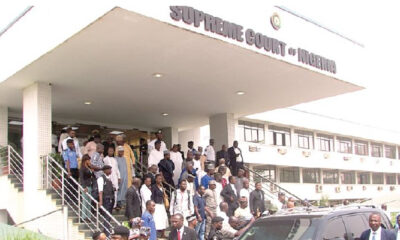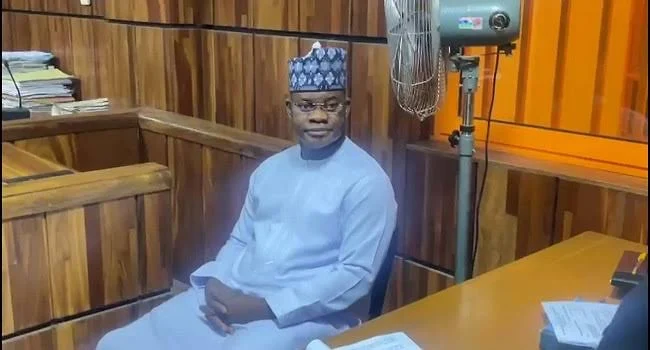The Nigerian Electricity Regulatory Commission (NERC) has backed down on its earlier plan to raise electricity tariffs effective April 1 this year.
In a directive issued on Tuesday titled: “Order on the Transition to Cost Reflective Tariffs in NESI,” the commission announced its decision not to go ahead with the increase.
“There shall be no increase in tariff of end-use customers on April 1, 2020,” the commission announced on its official Twitter handle.
Order 198/2020 says, ‘There shall be no increase in tariff of end-use customers on April 1, 2020. Performance Improvement Plan will form the basis for future tariff review. For more on Order198/2020https://t.co/COvLD3gDSJ @MobilePunch @vanguardngrnews @AIT_Online @channelstvbiz
— NERC Nigeria (@NERCNG) March 31, 2020
https://platform.twitter.com/widgets.js
Order 198/2020 says there shall no increase in end-use electricity customers on April 1, 2020. For details on Order 198/2020 https://t.co/OjQ8WDnMxw @PremiumTimesng @dailytrust @LeadershipNGA @businessdaynews @GuardianNigeria @business @BBCWorld @CNNAfrica @thecableng @TheSun
— NERC Nigeria (@NERCNG) March 31, 2020
https://platform.twitter.com/widgets.js
1. @NERCNG issues Order no- 198/2020 entitled ‘Order on the Transition to Cost Reflective Tariffs in NESI.’ The Order directs operators to submit a performance improvement plan (PIP) committing them to a higher quality of service. It retains the existing tariff regime
— NERC Nigeria (@NERCNG) March 31, 2020
https://platform.twitter.com/widgets.js
Instead, the commission asked operators in the power sector, including electricity generation and distribution companies, to submit a performance improvement plan (PIP) committing them to a higher quality of service.
The agency said the existing tariff regime would be retained, while the performance improvement plan would form the basis for future tariff review.
The commission did not say when the new electricity tariff would be executed.
On December 31, 2019, NERC had announced its plans to immediately review electricity tariffs in the country from January 1.
The order, titled “December 2019 MYTO Minor Review Order” for the 11 electricity distribution companies (Discos) was jointly signed by the Chairman of the Commission, Joseph Momoh, and the Commissioner for Legal, License & Compliance, Dafe Akpeneye.
However, the commission clarified later that the new tariff regime would not take effect until April 1, 2020, to allow it sufficient time to consult all the interest groups following misgivings by many Nigerians.
The federal government had also offered to continue to subsidize the gap in electricity cost to consumers pending the adjustment in tariffs.
The NERC order involved the review of the electricity tariffs chargeable by the 11 DISCos for all categories of consumers in the country, except the residential category (R1).
But a review of new tariffs by PREMIUM TIMES showed price increases would have ranged between 60 percent in places like Ikeja, to about 73 percent in Abuja, and about 78 percent in Enugu.
For instance, residential consumers, particularly those categorized as R2, in Ikeja, who have been paying about N13.34 per kilowatt-hour (kWh) under the 2015 MYTO would be paying about 59.7 percent increase.
Similarly, their counterparts in Enugu, who have been paying about N17.42 per kWh since 2015 will be paying about N30.93 kWh, about 77.6 percent hike under the new dispensation.
Consumers in Abuja and environs who have been paying N27.20 per kWh since 2015, will be paying N47.09 per kWh, over 73 percent increase.
Except for consumers in the Residential (R1) category, who will continue to pay N4 per kWh, all other categories of consumers, namely commercial, industrial and special, will pay higher tariffs, some as high as over 100 percent.
The R1 are those categorized as poor under the life-line group consuming about 50 kWh or less.
The R2 consumers are those residing in houses, flats, or multi-storeyed buildings and using single or three-phase meters. These consist of the bulk of the consumers spread across the country.
R3 consumers are those who reside in houses, flats or multi-storeyed buildings, but use low voltage maximum demand load, while their R4 counterparts use high voltage maximum demand load (11|33kV).
Tuesday’s directive, however, means there will be no increase in the tariffs for now.

 BIG STORY1 day ago
BIG STORY1 day ago
 BIG STORY3 days ago
BIG STORY3 days ago
 BIG STORY4 days ago
BIG STORY4 days ago
 BIG STORY3 days ago
BIG STORY3 days ago
 BIG STORY2 days ago
BIG STORY2 days ago
 BIG STORY2 days ago
BIG STORY2 days ago
 BIG STORY21 hours ago
BIG STORY21 hours ago
 BIG STORY3 days ago
BIG STORY3 days ago
























